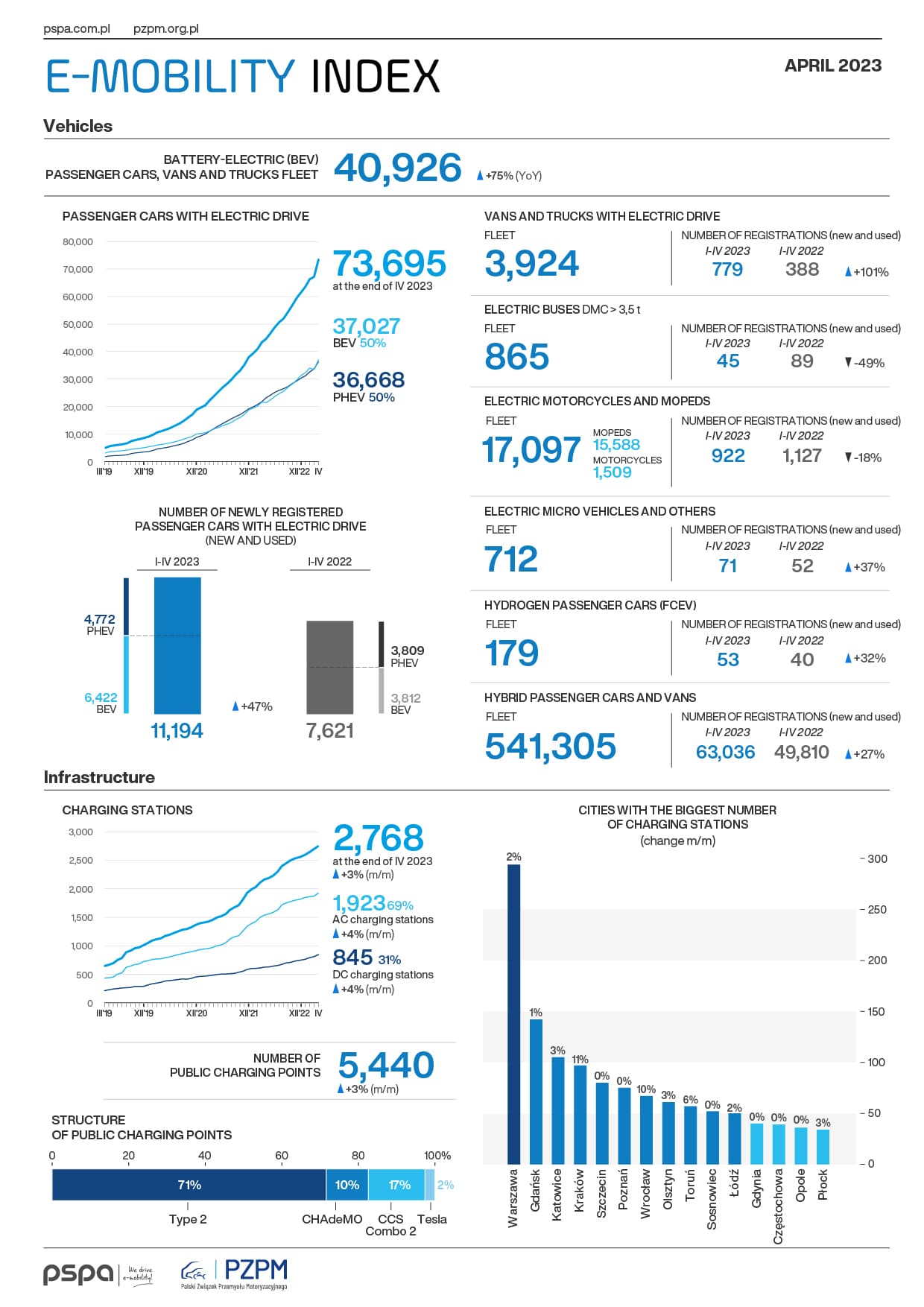According to the figures from the end of April 2023, a total of 40,926 passenger and commercial all-electric vehicles (BEVs) were registered in Poland. In the first four months of this year, their number increased by 7,201 units, i.e. 71% more than in the same period of 2022. – according to the Electromobility Index, launched by PZPM and PSPA.
At the end of April 2023, 73,695 electric passenger cars were on Polish roads. The fleet of fully electric cars (BEV, battery electric vehicles) amounted to 37 027 units and the fleet of plug-in hybrid electric vehicles (PHEV, plug-in hybrid electric vehicles) to 36 668 units. The number of electric vans and trucks was 3,924 units, of which BEVs accounted for more than 99%. The fleet of electric mopeds and motorbikes is also growing steadily, comprising 17,097 units at the end of April, as well as the number of hybrid cars and vans, which increased to 541,305 units. By the end of last month, Poland’s electric bus fleet had increased to 865 units.
In parallel to the fleet of electric vehicles, the charging infrastructure is also developing. At the end of April 2023, there were 2768 publicly available electric vehicle charging stations (5440 points) in Poland. 31% of these were direct current (DC) fast charging stations and 69% were slow alternating current (AC) chargers of 22 kW or less. In April, 69 new public charging stations were launched (135 points).
– Recent months have shown that in Poland, plug-in hybrids are attracting interest comparable to battery cars. Probably one of the reasons for this interest is the fact that the charging network is still insufficient for the needs. The very good result of registrations of trucks and, above all, vans is connected with the fact that many companies using fleets of these vehicles have their own charging stations located at bases. Furthermore, with more and more cities deciding to close their centres to non-zero-emission cars, it is to be expected that the number of electric delivery vehicles will grow very rapidly. It can also be assumed that if manufacturers were not still experiencing problems with the supply of semiconductors, the number of cars delivered to the market would be much higher, as currently the demand for these cars far exceeds production capacity, says – Jakub Faryś, President of PZPM.
– It is worth noting that in April a record was set in terms of the number of newly registered electric cars with GVW over 3.5t. More than 30 such vehicles hit the Polish roads. Such a result is particularly encouraging given the lack of availability in our country of subsidies addressed to buyers of N2 and N3 category cars. In addition to the implementation of subsidies, the electrification of this sector on a mass scale requires the introduction of a number of regulatory changes, including, among others, the exemption of eHDVs from tolls on national roads, or the streamlining of the process of connecting ultra-high-speed charging stations to the electricity grid. In the context of the rapidly progressing transformation of the transport sector in the EU, the validity of a comprehensive support system is a key condition for strengthening the competitiveness of Polish hauliers and maintaining their leading position in the European TSL industry. As a reminder – we are talking about an industry which employs almost one million people in Poland and contributes almost 6% to the country’s GDP – says Maciej Mazur, Managing Director of the PSPA.



















